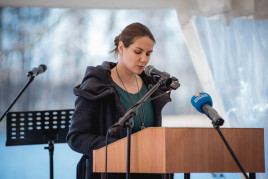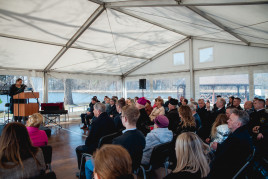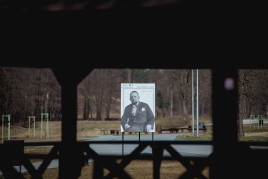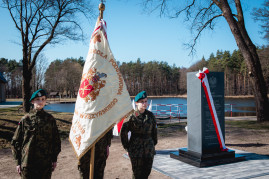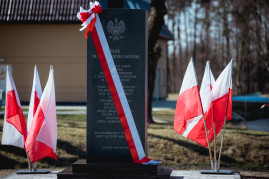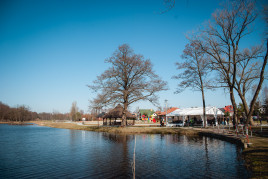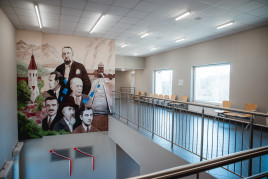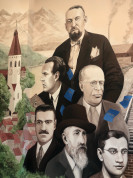News - Instytut Pileckiego
On the National Day of Remembrance for Poles rescuing Jews under German Occupation (24 March), just a few kilometres from Brzóza Królewska, where we commemorated the Kazak family, the opening of the revitalised park at Staw Traczewski in Głogów took place.
Its patron was Aleksander Ładoś, a Polish diplomat, politician and journalist who was the Polish envoy in Bern from 1940-1945 and the leader of the Ładoś Group. The Ładoś family has been connected with Głogów Małopolski since the 18th century, when they arrived there from Hungary.
During the Second World War, Aleksander Ładoś and his colleagues carried out the so-called passport operation to rescue Jews from occupied Europe by issuing them with documents of South and Central American countries: Paraguay, Honduras, Haiti and Peru. The passports confirmed the citizenship of these countries and thus increased their bearers' chances of survival. Jews were often sent to internment camps instead of extermination camps, which gave them the opportunity to be exchanged for prisoners of war held by the Allies.
"(...) in the face of war, in defence of humanitarian values and human life, Poles and Jews stood shoulder to shoulder. The passport operation would not have been possible without the cooperation of Polish diplomats and representatives of Jewish communities. Aleksander Ładoś allowed the operation to proceed and intervened when everyone needed him the most," said Monika Maniewska, a member of the International Ładoś Group Committee, co-author of "The Ładoś List", and a researcher at the Pilecki Institute who has been working on this extraordinary story since 2018.
The solemn celebrations, organized by the city's mayor, were accompanied by the dedication of an obelisk, a concert, the unveiling of a mural depicting the Ładoś Group and an open-air exhibition prepared by the Education Department of the Institute of National Remembrance in Rzeszów.
See also
- Competition for the position of Adjunct in the Humanities, Department for the study of Nazism and German occupation during the Second World War
News
Competition for the position of Adjunct in the Humanities, Department for the study of Nazism and German occupation during the Second World War
We invite you to participate in the competition for the position of Adjunct in the Humanities, Department for the study of Nazism and German occupation during the Second World War.
- PORTRAITS | Adam Bałdych Quintet
News
PORTRAITS | Adam Bałdych Quintet
“Portraits” is a moving story told through sound, in which jazz meets history and individual fates intertwine with the collective experience.
- Competition for the position of Adjunct in the Humanities
News
Competition for the position of Adjunct in the Humanities
Competition for the position of Adjunct in the Humanities, Department for the study of Nazism and German occupation during the Second World War at the Witold Pilecki Institute of Solidarity and Valor.
- Merry Christmas!
News
Merry Christmas!
On the occasion of Christmas, we wish you all the best and every success in 2026.
- The Lemkin Laboratory – the Pilecki Institute and the Mieroszewski Centre sign cooperation agreement
News
The Lemkin Laboratory – the Pilecki Institute and the Mieroszewski Centre sign cooperation agreement
- 2025 | Michał Bilewicz, „Traumaland. Polacy w cieniu przeszłości"
News
2025 | Michał Bilewicz, „Traumaland. Polacy w cieniu przeszłości"
Michał Bilewicz’s “Traumaland. Polacy w cieniu przeszłości” (Wydawnictwo MANDO/Wydawnictwo WAM) won the Witold Pilecki International Book Award in the “academic history book” category.
- 2025 | Emil Marat „Bratny. Hamlet rozstrzelany"
News
2025 | Emil Marat „Bratny. Hamlet rozstrzelany"
The book “Bratny. Hamlet rozstrzelany” (Wydawnictwo Czarne) won the Witold Pilecki International Book Award in the “historical reportage” category.
- Maksym Eristavi, Russian Colonialism 101. How to Occupy a Neighbor and Get Away with It. An Illustrated Guide
News
Maksym Eristavi, Russian Colonialism 101. How to Occupy a Neighbor and Get Away with It. An Illustrated Guide
Maksym Eristavi’s “Russian Colonialism 101. How to Occupy a Neighbor and Get Away with It. An Illustrated Guide” (IST Publishing) won the the Witold Pilecki International Book Award in the “special prize” category.
- The Witold Pilecki International Book Award: Bilewicz, Marat and Eristavi winners of the Institute’s 5th competition for best history book
News
The Witold Pilecki International Book Award: Bilewicz, Marat and Eristavi winners of the Institute’s 5th competition for best history book
The Witold Pilecki International Book Awards were presented during a ceremony on Thursday 11 December, in the auditorium of the Pilecki Institute.
- Conference summary “Die Haltung der deutschen Minderheiten im besetzten Europa (1939–1945). Forschungsmethoden, soziale Kontexte und Nachkriegsfolgen”
News
Conference summary “Die Haltung der deutschen Minderheiten im besetzten Europa (1939–1945). Forschungsmethoden, soziale Kontexte und Nachkriegsfolgen”
On 20–21 November 2025, an international academic conference was held in Berlin and addressed issues of the attitudes of the German population during the occupation and their postwar fate.
- Results of the Competition for the position of Manager of the Extraneous Branch of the Witold Pilecki Institute of Solidarity and Valor in Berlin
News
Results of the Competition for the position of Manager of the Extraneous Branch of the Witold Pilecki Institute of Solidarity and Valor in Berlin
Warsaw, 20 November 2025 | Announcement of the results of the Competition for the position of Manager of the Extraneous Branch of the Witold Pilecki Institute of Solidarity and Valor in Berlin.
- Nominations for the Witold Pilecki International Book Award 2025 (fifth edition)
News
Nominations for the Witold Pilecki International Book Award 2025 (fifth edition)
We know the authors nominated for the fifth edition of the Witold Pilecki International Book Award! Out of 60 submissions, the Awards Committee has selected 12 publications to compete in three categories.
